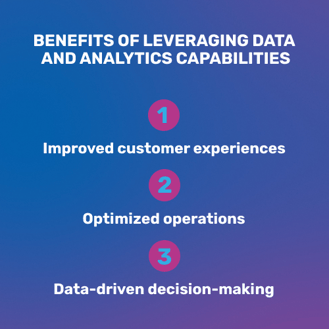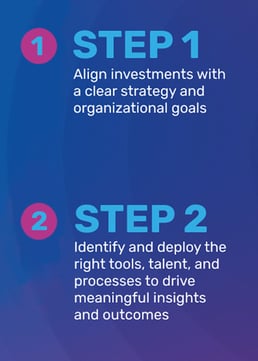Embrace a holistic approach to customer obsession

Why are so many companies failing to see the expected ROI of their recent data management and analytics investments? The answer lies in the complexity of modernization and the misalignment of expectations.
While many companies have made strides in modernizing their data platforms by migrating to the cloud, the journey doesn't end there. Becoming a customer-obsessed company requires more than just technology upgrades; it requires a holistic approach to data culture and analytics capabilities. Investing in new technology without a clear strategy and data-driven culture will not yield the desired results.
Today, many managers and executives are struggling to see a return on investment (ROI) from these modernization efforts. Senior leadership is scrutinizing data modernization expenditures and questioning what they have gained from their investments in infrastructure.
Let’s rewind for a minute.
Challenges to data platform modernization efforts
Pre-pandemic, a modern data culture was rapidly becoming essential for businesses to stay competitive and cost-effective. The rise of technology and the increasing availability of data had opened up new opportunities for companies to leverage analytics and make data-driven decisions. However, not all businesses had fully embraced this shift, with many still prioritizing cost savings over leveraging data for a competitive advantage. 
Then, the world was hit by a global pandemic. This unprecedented event ignited substantial and rapid-paced investment in digital transformation. Organizations, both big and small, were forced to pivot to online platforms as shuttering physical locations. Workforces of all kinds transitioned to working remotely, driving an increased investment in technology to support this new way of working.
Amidst these forced changes, executives began to invest in the accelerated need for improved data access and technology to maintain or gain a competitive edge. Prior to the pandemic, a McKinsey study reported that around half of executives said cost savings was their top priority with their digital strategy. However, by late 2020, half of the respondents stated that competitive advantage had become their top priority. As we’ve likely all seen firsthand, executives were placing big bets on technology and analytics capabilities.
As we fast forward, the Conference Board 2023 C-Suite Outlook survey found that CEOs continue to look to innovation, technology, and talent to ensure growth for the business. However, about two-thirds of CEOs (65%) say they are planning to increase budgets for new customer acquisition as well as customer service and experience, with 58% increasing budget for new product/service development. This implies that the rapid pace of digital transformation continues to push companies to modernize their data platforms and migrate to cloud providers.
The pandemic may have accelerated the adoption of modern architecture for some companies, but it also brought along challenges. The urgency to pivot quickly to online platforms may have led to rushed decision-making and an emphasis on short-term fixes rather than long-term strategies. Companies that had already embarked on their modernization journey prior to the pandemic were better prepared to navigate these challenges and had a more solid foundation to build upon.
Additionally, measuring the ROI of data modernization is not always straight-forward. The benefits of leveraging data and analytics capabilities can be seen across various aspects of the business, such as improved customer experiences, optimized operations, and data-driven decision-making. However, quantifying these benefits and attributing them solely to technology investments can be cumbersome.
Optimizing the ROI of data modernization
 To address this resurgence of pressure on investments to show fast time-to-value, we’re here to help companies take a step back and assess their approach to data modernization. We will first need to align your investments with a clear strategy and organizational goals, ensuring that the right tools, talent, and processes are in place to drive meaningful insights and outcomes.
To address this resurgence of pressure on investments to show fast time-to-value, we’re here to help companies take a step back and assess their approach to data modernization. We will first need to align your investments with a clear strategy and organizational goals, ensuring that the right tools, talent, and processes are in place to drive meaningful insights and outcomes.
Ultimately, the modern data culture that became essential during the pandemic will still be just as crucial in 2024. The pandemic may have played a role in accelerating investments in technology, yet success lies in the ability to leverage data and technology effectively to gain a competitive advantage. It's time for managers and executives to re-evaluate their approach, refocus their efforts, and embrace a data-driven future.
At iTalent Digital, our Data and Analytics specialists help clients
(1) accelerate digital transformation,
(2) govern business critical data assets, and
(3) drive analytics as a service throughout the organization.
Contact us at itbi@italentdigital.com to get more value from your data and maximize the ROI on your platform modernization investments. Visit our website for more information about iTalent Digital's BI, Data & Analytics Practice.
You may also like:
What is a chief data and analytics officer, and why do you need one?
7 ways to unlock new business value during economic turbulence
Elevate your decision-making with Power BI’s AI capabilities



